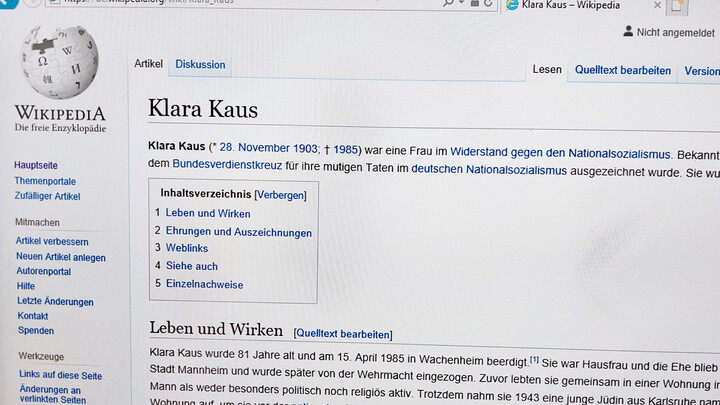New Wikipedia Content: Resistance Members from in and around Mannheim
Students at the University of Mannheim have been producing Wikipedia articles about courageous women and men involved in everyday acts of resistance to Nazism in the context of an interdisciplinary tandem seminar in history and German linguistics. Most of the resisters described by the students were from Mannheim and its surroundings. They are people who risked their lives and yet remained largely unknown – like Klara Kaus from Mannheim or the architect Dr. Max Schmechel.

Klara Kaus, born in 1903, did not put up active political opposition to the Nazi regime. Nevertheless, she offered the shelter of her Mannheim apartment to a young Jewish woman from Karlsruhe to protect her from the Nazi persecution of Jews. The 14-year-old Ellen moved in with this woman, initially a stranger to her, who gave her shelter for two years and shared her rations stamps. Even after Klara Kaus’s apartment was destroyed in a bombing raid, she took Ellen into her new, smaller apartment. Decades elapsed before the merits of Klara Kaus were publicly recognized; she received the Federal Cross of Merit in 1973 and was recognized as Righteous Among the Nations by Yad Vashem one year later.
Stories like hers form the subject matter tackled in the interdisciplinary seminar Resistance to National Socialism on the German Wikipedia at the University of Mannheim. The tandem seminar was jointly developed by Germanist Dr. Maja Linthe and historian Professor Angela Borgstedt and brings pairs of students from both disciplines together to create Wikipedia articles about outstanding individuals who dared to put up resistance to the Nazi regime in ways that are still largely unknown. People like Klara Kaus, the Heidelberg musician Stephanie Pellissier, or Dr. Max Schmechel.
The well-known Mannheim architect Max Schmechel left traces on Mannheim's cityscape that are still visible today: his projects include several villas in Bassermannstrasse, houses in the Lindenhof district, and the Hafenkirche church in Jungbusch. He resisted the regime by organizing private meetings in his home for Protestants who opposed the Nazis. He, too, has barely been mentioned in literature on the resistance, and only in passing when he is mentioned at all. This was ascertained by two students who researched Schmechel's biography and worked on the Wikipedia page dedicated to him.
A total of twenty-two such entries were created or expanded during the seminar and can now be viewed on the free encyclopedia.
Text: Yvonne Kaul / October 2022
